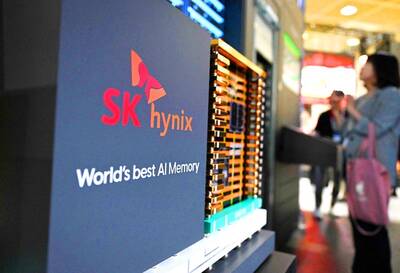Asia Pacific Telecom Co (亞太電信), an arm of Hon Hai Precision Industry Co (鴻海精密), yesterday said that it has received approval from the regulator to build a fifth-generation (5G) wireless trial network in preparation for a commercial launch in 2020.
Asia Pacific is the first telecom to obtain permission from the National Communications Commission to deploy 5G technology, ahead of bigger rivals, led by Chunghwa Telecom Co (中華電信).
Asia Pacific expects to complete deployment of its 5G trial network in less than the required six months, allowing to it to offer the service by the end of this year.
Trials are to take place in Taipei’s Neihu District (內湖), New Taipei City’s Tucheng District (土城) and at the Hsinchu campus of National Chiao Tung University, the company said.
The 5G project was submitted jointly by Asia Pacific and Hon Hai Technology Group (鴻海科技集團), along with National Chiao Tung University, the company said.
While the official standards for 5G have not yet been ratified by the International Telecommunication Union, Asia Pacific said that the trial network would test the technology so it is ready for commercial launch once the standards are confirmed.
The company said that 5G wireless access has the potential to provide high-speed Internet at one gigabyte per second for a wide range of services, such as smart city applications, rivaling glass fiber solutions.
Asia Pacific began offering eight major smart services two years ago, including services through the humanoid robot Pepper, smart transportation, smart retailing and smart home applications, the company said.
Artificial intelligence, Internet of Things and robotic services are to be delivered via the 5G network, Asia Pacific said.
At the end of last year, Asia Pacific had increased its 4G subscriptions to 22.5 million, from 18.06 million in 2016, pushing up its 4G penetration to 78 percent.

Quanta Computer Inc (廣達) chairman Barry Lam (林百里) is expected to share his views about the artificial intelligence (AI) industry’s prospects during his speech at the company’s 37th anniversary ceremony, as AI servers have become a new growth engine for the equipment manufacturing service provider. Lam’s speech is much anticipated, as Quanta has risen as one of the world’s major AI server suppliers. The company reported a 30 percent year-on-year growth in consolidated revenue to NT$1.41 trillion (US$43.35 billion) last year, thanks to fast-growing demand for servers, especially those with AI capabilities. The company told investors in November last year that

United Microelectronics Corp (UMC, 聯電) forecast that its wafer shipments this quarter would grow up to 7 percent sequentially and the factory utilization rate would rise to 75 percent, indicating that customers did not alter their ordering behavior due to the US President Donald Trump’s capricious US tariff policies. However, the uncertainty about US tariffs has weighed on the chipmaker’s business visibility for the second half of this year, UMC chief financial officer Liu Chi-tung (劉啟東) said at an online earnings conference yesterday. “Although the escalating trade tensions and global tariff policies have increased uncertainty in the semiconductor industry, we have not

Power supply and electronic components maker Delta Electronics Inc (台達電) yesterday said it plans to ship its new 1 megawatt charging systems for electric trucks and buses in the first half of next year at the earliest. The new charging piles, which deliver up to 1 megawatt of charging power, are designed for heavy-duty electric vehicles, and support a maximum current of 1,500 amperes and output of 1,250 volts, Delta said in a news release. “If everything goes smoothly, we could begin shipping those new charging systems as early as in the first half of next year,” a company official said. The new

SK Hynix Inc warned of increased volatility in the second half of this year despite resilient demand for artificial intelligence (AI) memory chips from big tech providers, reflecting the uncertainty surrounding US tariffs. The company reported a better-than-projected 158 percent jump in March-quarter operating income, propelled in part by stockpiling ahead of US President Donald Trump’s tariffs. SK Hynix stuck with a forecast for a doubling in demand for the high-bandwidth memory (HBM) essential to Nvidia Corp’s AI accelerators, which in turn drive giant data centers built by the likes of Microsoft Corp and Amazon.com Inc. That SK Hynix is maintaining its